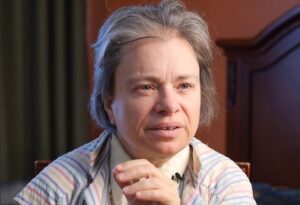
Rachel M. MacNair, Ph.D.
EDUCATIONAL BACKGROUND:
Ph.D., Psychology & Sociology, University of Missouri at Kansas City December, 1999, GPA: 3.964
Bachelor of Arts, Peace and Conflict Studies, Earlham College, Richmond, Indiana, With honors, June, 1978
Valedictorian, Paseo High School, Kansas City, Missouri
PROFESSIONAL BACKGROUND:
Independent practice, statistics consulting primarily for students, 1999-present
TERMS ON BOARD OF DIRECTORS:
Kansas City Interfaith Peace Alliance, 1979-1983
Civilian-Based Defense Association, 1980-1984
Consistent Life Network, 1987-present
Vice-President, 1992-present
American Psychological Association Division 48, Peace Psychology 2008-2014
AWARDS:
Arthur Mag Fellowship, September, 1997-May, 1998
Chancellor’s Interdisciplinary Fellowship, May, 1997 (awarded but turned down for Mag Fellowship)
Chancellor’s Special Merit Award, May, 1997
Chancellor’s Interdisciplinary Fellowship, September, 1998-May, 1999
Outstanding Service Award, Division 48, American Psychological Association, 2011
Charles E. Bebb Peace Merit Award, For Outstanding Service in the Cause of Peace. PeaceWorks, Kansas City, 2013
PUBLICATIONS OF RESEARCH AND SCHOLARSHIP:
MacNair, R. M. (1998). The psychology of becoming vegetarian. Vegetarian Nutrition: An International Journal, 2, 96-102.
Dissertation: MacNair, R. M. (1999) Symptom pattern differences for Perpetration-Induced Traumatic Stress in veterans: Probing the National Vietnam Veterans Readjustment Study. University of Missouri at Kansas City, November 30, 1999.
MacNair, R. M. (2001). Commentary: McDonald’s “Empirical Look at Becoming Vegan.” Society and Animals, 9, 63-69.
MacNair, R. M. (2001). Psychological reverberations for the killers: Preliminary historical evidence for Perpetration-Induced Traumatic Stress. Genocide Research, vol. 3., no. 2.
MacNair, R. M. (2002). Brief Report: Perpetration-Induced Traumatic Stress in combat veterans. Peace and Conflict: Journal of Peace Psychology, 8, pp. 63-72.
MacNair, R. M. (2002). The effects of violence on perpetrators. Peace Review: A Transnational Quarterly, 14, pp. 67-72.
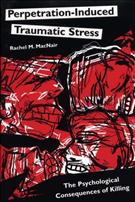
BOOK: MacNair, R. M. (2002). Perpetration-Induced Traumatic Stress: The psychological consequences of killing. Westport, CT: Praeger Publishers.
BOOK: MacNair, R. M. (2003). The psychology of peace: An introduction. Westport, CT: Praeger Publishers.
MacNair, R. M. (2004). Killing as trauma: The religious implications of Perpetration-Induced Traumatic Stress. Research in the Social Scientific Study of Religion, 15, pp. 17-39.
MacNair, R.M. (2006). Violence begets violence: The consequences of violence become causation. In M. Fitzduff & C. Stout, The psychology of war, conflict resolution, and peace. Westport, CT: Praeger, pp.191-210.
 BOOK: MacNair, R. M. (Ed.). (2006). Working for peace: A handbook of practical psychology and other tools. Atascadero, California: Impact Publishers.
BOOK: MacNair, R. M. (Ed.). (2006). Working for peace: A handbook of practical psychology and other tools. Atascadero, California: Impact Publishers.
MacNair, R. M. (2007). Killing as trauma. In E. K. Carll (Ed.),Trauma psychology. Westport, CT: Greenwood Praeger, Chapter 6, pp. 147-162.
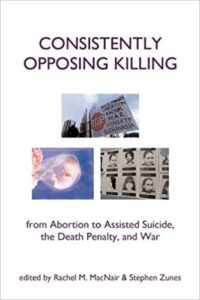
BOOK: MacNair, R. M. & Zunes, S. J. (Eds). (2008). Consistently opposing killing: From abortion to assisted suicide, the death penalty, and war. Westport, CT: Praeger.
MacNair, R. M. (2009). Psychology of nonkilling. In J. E. Pim (Ed.), Toward a nonkilling paradigm. Honolulu, Hawaii: Center for Global Nonkilling.
MacNair, R. M. (2010). Killing as etiological stressor and the DSM-V definition of Posttraumatic Stress Disorder. Trauma Psychology, Division 56 American Psychological Association Newsletter, 5, 12-15.
MacNair, R. M. (2010). Traumatic Stress, Perpetration-Induced. In D. J. Christie (Ed.), Encyclopedia of Peace Psychology. Hoboken, New Jersey: Wiley-Blackwell.
MacNair, R. M. (2011) Perpetration-Induced Traumatic Stress. In M. Pilisuk & M. N. Nagler (Eds.), Peace movements worldwide: Volume 2, Players and practices in resistance to war. Santa Barbara, CA: ABC-CLIO / Praeger, pp. 263-270.

BOOK: MacNair, R. M. (2012). The psychology of peace: An introduction. Second Edition. Westport, CT: Praeger Publishers.
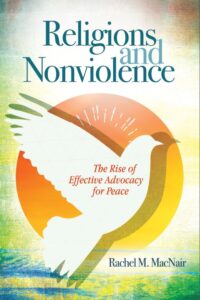
BOOK: MacNair, R.M. (2015). Religions and nonviolence: The rise of effective advocacy for peace. Westport, CT: Praeger Publishers.
MacNair, R. M. (2015). Chapter 2, Theories underlying research in peace psychology. In D. Bretherton & S. Fang (Eds.), Methodologies in Peace Psychology: Peace Research by Peaceful Means, New York: Springer (“Peace Psychology Book Series”)
MacNair, R. M. (2015) Causing trauma as a form of trauma. Peace and Conflict: Journal of Peace Psychology, 21(3), 313-321
(special section on collective harm-doing)
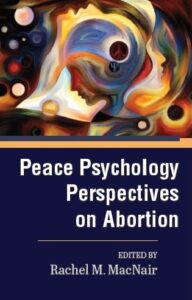
BOOK: MacNair, R.M. (Ed.) (2016). Peace psychology perspectives on abortion. Kansas City: Feminism & Nonviolence Studies Association.
MacNair, R. M. (2018): Chapter 4, “The Psychology of Agents of Repression: The Paradox of Defection. ” In L. Smithy & L. Kurtz (Eds.), The Paradox of Repression and Nonviolent Movements, Syracuse University Press.
MacNair, R. M. (2019) Chapter 16, “Turning Problems into Potential: Positive Social Movement Dynamics.” In M.G. C. Njoku, L. A Jason, & R.B. Johnson (Eds.), The Psychology of Peace Promotion, Springer Publishers
PRESENTATIONS OF RESEARCH AND SCHOLARSHIP:
Poster: “Perpetration-Induced Traumatic Stress in Veterans” American Psychological Association, August 21, 1999.
Paper: “Historical Evidence for Psychological Consequences of Killing for the Nazis,” Association of Genocide Scholars, June 14, 1999.
Paper: “Quantifying Sociological and Psychological Characteristics of Divided Passions on Connected Social Issues” Midwest
Sociological Society, April 20, 2000
Paper: “Health Considerations in Becoming Vegetarian” Midwest Sociological Society, April 22, 2000
Roundtable: “Perpetration-Induced Traumatic Stress: Policy and Social Implications” Society for the Psychological Study of Social Issues, June 18, 2000
Chairperson/Organizer of Symposium: “The Psychological Consequences of Killing: Perpetration-Induced Traumatic Stress.” American Psychological Association, August 4, 2000
Paper: “Perpetration-Induced Traumatic Stress: Severity and Patterns” American Psychological Association, August 4, 2000
Poster: “Quantifying Psychological Characteristics of Different Stands on Connected Social Issues” American Psychological Association, August 5, 2000
Paper: “The Healing Community and the Psychological Consequences of Killing: Understanding Perpetration-Induced Traumatic Stress,” Friends Association for Higher Education/Friends Council on Education conference, June 15, 2001.
Paper: “The Post-Killing Ordeal: Perpetration-Induced Traumatic Stress,” joint conference of the Peace Studies Association and the Consortium of Peace Research, Education and Development, October 5, 2001.
Panel Presentation: “A Proposal to Study the September 11 Attacks Aftermath by War Hysteria Presence and Absence,” joint conference of the Peace Studies Association and the Consortium of Peace Research, Education and Development, October 5, 2001.
Paper: “Psychological Causes and Consequences of Violence and Nonviolence,” Friends Association for Higher Education, June 20-23, 2002
Presentation: ” An Introductory Textbook in Peace Psychology,” Peace and Justice Studies Association, October 5, 2002
Paper: “The Psychology of Hell: Religious Implications of Killing as Trauma,” Mid-Winter Research Conference on Religion and Spirituality, hosted by Division 36 (Psychology of Religion) of the American Psychological Association, March 29, 2003
Conversation Hour: “Religious and Spiritual Aspects of Peace Psychology,” American Psychological Association, August 9, 2003
Paper: “Connecting Issues of Violence to Foster Dialog Among Diverse Activists,” Peace and Justice Studies Association, October 10, 2003
Paper: “The Dove Needs Both Wings to Fly: Religious Right & Left Viewpoints on Violence,” Mid-Winter Research Conference on Religion and Spirituality, hosted by Division 36 (Psychology of Religion) of the American Psychological Association, March 20, 2004
Chair of Symposium, “The Role of Cognitive Consistency in Nonviolence and Non-discrimination,” Society for the Psychological Study of Social Issues, June 25-27, 2004
Paper, “Perceptions of Consistency on Social Issues,” Society for the Psychological Study of Social Issues, June 25-27, 2004
Chair of Symposium, “Interfaith Dialog in Building Peace: Understanding the Psychological Dynamics,” American Psychological Association, July 30, 2004
Paper, “Issues of Violence in the Religious Right and Religious Left,” American Psychological Association, July 30, 2004
Paper, “The Psychology of How Gandhian Nonviolence Works on Attackers,” First Annual Gandhian Nonviolence Conference, October 9, 2004
Paper, “Psychological Theories of Why Nonviolent Confrontation is Effective,” Peace and Justice Studies Association, October 16, 2004
Paper, “Psychological Theories on the Effectiveness of Nonviolent Action and Strategies for Future Research,” Third Annual Mid-Year Research Conference on Religion and Spirituality, April 1-2, 2005
Paper, “The Dove Needs Both Wings to Fly: The Right Wing and Peace Studies,” Friends Association for Higher Education, June 16-19, 2005
Workshop/Continuing Education Credit, “Killing as Trauma: Perpetration-Induced Traumatic Stress (PITS) in Healing and Violence Prevention,” Psychologists for Social Responsibility, May 20, 2005
Workshop, “Positions and Interests: Applying Integrative Conflict Resolution Skills to the Left-Wing/Right-Wing Divide,” Psychologists for Social Responsibility, May 20, 2005
Paper, “Gaining Mind of Peace: Conversations About Violence and Nonviolence Using Peace Psychology,” World Peace Forum, June 25, 2006
Paper, “The Impact of the Abortion Debate on Achieving Peace Movement Goals,” International Peace Research Association, June 30, 2006.
Paper, “Teaching Peace Psychology to Many Audiences,” International Peace Research Association, June 30, 2006
Paper, “Psychological Theories of Nonviolence,” International Peace Research Association, June 30, 2006
Paper, “The Role of Perpetration-Induced Traumatic Stress in Perpetuation of Violence and in Reconciliation,” International Peace Research Association, July 2, 2006
Paper, “Addressing the Left-Wing/Right-Wing Division: Applying Integrative Conflict Resolution Skills,” International Peace Research Association, July 2, 2006
Paper, “Increasing Activists’ Effectiveness by Communicating Psychological Knowledge,” American Psychological Association, August 10, 2006
Paper: “Models of Legitimizing and De-legitimizing Violence for Youth,” Third Annual Gandhian Nonviolence Conference, October 13, 2006
Paper: “Psychology for Peace Education and Activism,” Third Annual Gandhian Nonviolence Conference, October 14, 2006
Poster, ” Killing as Trauma: A Secondary Analysis of the National Vietnam Veterans Readjustment Study,” International Society for Traumatic Stress Studies, November 5, 2006
Paper: “Lessons on Trauma from the Psychology Delegation to Vietnam and Cambodia,” Friends Association for Higher Education, June 15, 2007
Paper: “Killing as Trauma,” in symposium, “Psychological Trauma: Best Practices, Innovations, International Perspectives”, American Psychological Association, August 18, 2007

Paper: “The Nonviolent Diet: Research on Practitioners,” Peace & Justice Studies Association, September 29, 2007
Paper: “The Nonviolent Diet,” Fourth Annual Gandhi-King conference on Nonviolence, October 26, 2007
Paper: “The Relationship of the Machiavellian Personality, Sense of Coherence, and Ethics,” Mid-Year Research Conference on Religion & Spirituality, hosted by Division 36 (Psychology of Religion and Spirituality) of the American Psychological Association, March 1, 2008
Paper: “The People-to-People Psychology Delegation to Vietnam and Cambodia,” Society for the Psychological Study of Social Issues, June 28, 2008
Poster: “Resources for Teaching Peace Psychology to Middle- and High-School Youth,” Society for the Psychological Study of Social Issues, June 29, 2008
Poster: “Religious Aspects of Peace Psychology, War, and Nonviolent Campaigns,” American Psychological Association, August, 2008.
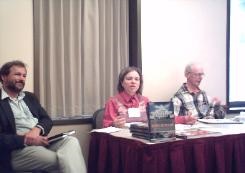
Chair of Symposium: “When Violent Behavior is the Etiological Stressor: Psychotherapy as Future Violence Prevention,” International Society for Traumatic Stress Studies, November 15, 2008
Paper: “Social Psychology: Post-trauma Symptoms and Causation of Violence,” International Society for Traumatic Stress Studies, November 15, 2008
Poster: “Applying the Concept of Violent Behavior as Etiological Stressor to Social Justice Controversies: A Set of Theoretical Questions” International Society for Traumatic Stress Studies, November 15, 2008
Paper: “The Anxiety of Acts of Killing” in symposium “Public Health Problems: Relationship to Anxiety and Trauma,” Anxiety Disorders Association of America, March 13, 2009
Paper: “The Nonviolent Diet in the Abundant Life: Research on Vegetarians,” Friends Association for Higher Education, June 19, 2009
Paper: “Comprehending Perpetration-Induced Traumatic Stress for Violence Healing and Prevention,” Inter-American Psychology Congress, held in Guatemala City, June 30, 2009
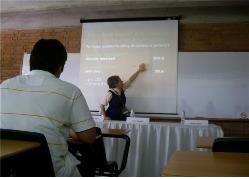
Poster: “Applying the ‘Perpetration-Induced Traumatic Stress’ Concept to Social Justice Controversies,” American Psychological Association, August 9, 2009
Paper: “The Heated Debates Survey: Evidence for Pro-Peace Arguments that Help Convince Pro-lifers,” Peace & Justice Studies Association, October 9, 2009
Paper: “Exploring the Power of the Nonviolent Diet: Research on Vegetarians,” Peace & Justice Studies Association, October 10, 2009
Poster, “Violence Begets Violence by Means of Perpetration-Induced Traumatic Stress,” National Summit on Interpersonal Violence and
Abuse across the Lifespan, February 24, 2010
Paper, “Rating the Impact of Arguments on Ethical Issues: Consistent Life Ethic and Perpetration-Induced Traumatic Stress,” Mid-Year Conference on the Psychology of Religion and Spirituality, March 26, 2010
Paper, “The Association of Vegetarian Practice and Religious Practice,” Mid-Year Conference on the Psychology of Religion and Spirituality, March 27, 2010
Paper, “Research on Vegetarians: Communicating the Nonviolent and Ecologically Sustainable Diet,” International Peace Research Association, Sydney Australia, July 6, 2010
Paper, “Communicating Against Executions and War: How Effective are Arguments that Combine Issues?,” International Peace
Research Association, Sydney Australia, July 7, 2010
Poster, “Inviting Pro-Lifers into the Web of Peace Builders: Survey Evidence,” Division 48, American Psychological Association, August 13, 2010.
Poster, Characteristics of Killing as Etiological Stressor: Definitional and Practical Implications,” Division 56, American Psychological Association, August 14, 2010.
Paper, “How a Recent Peace Psychology Textbook Covers Religion and Spirituality,” Mid-Year Conference on the Psychology of Religion and Spirituality, March 30, 2012
Paper, “A City Council in the Nuclear Weapons Business: A Case Study,” Division 48, American Psychological Association, August 3, 2012. Published in the Peace Psychology Newsletter, Spring, 2013 (newsletter of APA Division 48.)
Paper, “Research Agendas in Peace Psychology,” Peace and Justice Studies Association, October 18, 2014
Paper, “World Religions and Nonviolence,” Friends Association for Higher Education, June 19, 2015
Paper: “Moral Injury and Perpetration-Induced Traumatic Stress: Similarities and Differences,” Mid-Year Conference on the Psychology of Religion and Spirituality, March 11, 2016
Paper: “Killing as Trauma: The Promise and Problems of ‘Moral Injury’,” Peace & Justice Studies Association, October 28, 2017
Paper: “Interfaith Insights for Peace Psychology,” Annual Mid-Year Conference, Society for the Psychology of Religion and Spirituality, March 10, 2018
Paper: “The Psychology of the Nonviolent Diet,” American Psychological Association, August, 2018
Paper: “Peace Psychology Considers Abortion,” Friends Association for Higher Education, June 14, 2023.
American Psychological Association’s Division 48, Peace Psychology:
Membership chair for Division 48 (peace psychology), American Psychological Association, August 2008 – December 2011.
Represented Division 48 at the APA Science Leadership Conference, October, 2010
Elected for American Psychological Association (APA) Division 48, Peace Psychology: President-Elect for 2012, President for 2013, Past-President for 2014.
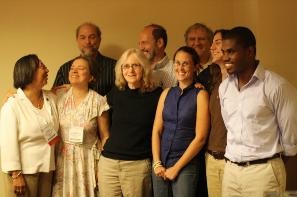
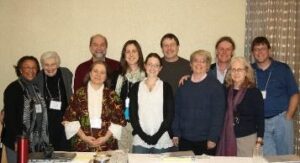
APA Division 48 Executive Committee group photos on different occasions
International Travel:
People to People Ambassador Program psychology delegation to Vietnam and Cambodia, November 7-17, 2006
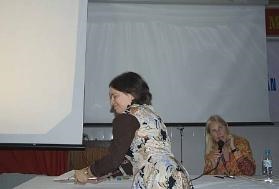
XXXII Congreso Interamericano de Psicología in Guatemala City, June 28-July 2, 2009
APA International Learning Partner Program delegation to Cuba, including the Hominis conference, May 8-15, 2016.
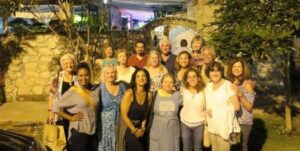
Keynote speech at the International Conference on Peace, Conflict, and Violence: Challenges and Resolution Strategies, Lahore, Pakistan, November 29-30, 2017. Four separate presentations given during that trip at COMSTAS University, University of Lahore, Beacon House National University of Lahore, and Government College University of Lahore
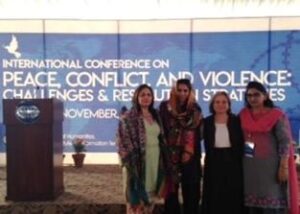
Reviewing:
Reviewer of proposals for the program of the annual conventions, American Psychological Association, Division 48 (Society for the Study of Peace, Conflict, and Violence), several years.
Reviewer of proposals for the 2006 conference of the Society for the Psychological Study of Social Issues, Division 9 of the American Psychological Association.
Reviewer for Peace & Justice Studies dissertation awards, 2007 and 2008
Reviewer for Peace and Conflict: Journal of Peace Psychology; PsycCRITIQUES; American Psychologist; Peace and Change: A Journal of Peace Research; Political Psychology; Journal of Peace Education; Journal of Traumatic Stress, Greenwood Publishers.
Other:
curriculum for introduction to peace psychology under “Peace Studies in Disciplinary Perspective,” pp. 520-523, in: McElwee, T. A., Welling Hall, B., Liechty, J. & Garber, J. (Eds.). (2009). Peace, justice, and security studies: A curriculum guide. Boulder: Lynne Rienner Publishers.